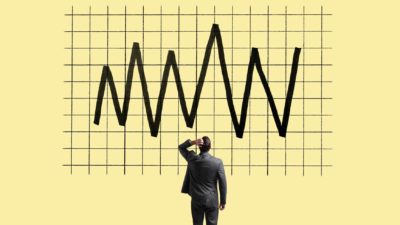If you follow me on social media, you'll know that, among other things, I've been banging on about the need for the federal government to restore both JobKeeper and JobSeeker.
No, I haven't been relieved of my senses.
Yes, I'm worried that the pile of debt we've amassed (and would add to) will be put in an extra-large can and kicked down the road.
No, I don't think the government should be a limitless ATM, to be tapped every time something goes wrong.
But I think we should restore JobKeeper and JobSeeker.
Here's why:
The economy — every economy — runs on Confidence.
Yes, so important, it deserves its own capital letter, if only for emphasis.
See, confidence is the single most important economic indicator there is.
It doesn't exist on its own, of course — things like the unemployment rate, wages growth, interest rates and a whole lot more go into how confident we feel — but, as a metric, it is the most important one we have.
Because the economy is a self-fulfilling prophecy.
If we feel optimistic, we spend. If we spend, we add to economic activity. By doing so, we create even more economic activity — businesses hire, they invest in new equipment, and their new employees also spend more. Hey, presto! — the economy grows.
If we feel worried, we keep the wallets and purses closed. When we do that, we harm retail sales. Businesses don't have the confidence — or the money — to hire, or to invest. That flows right through our economy… which contracts as a result.
Yep. What we expect becomes reality.
Now, let's go back to 2020. After a couple of smaller, largely ineffective stimulus measures, the federal government realised the economy was in trouble.
It introduced JobKeeper and JobSeeker.
All of a sudden, most businesses could afford to keep staff. Employees felt like the government had their back. Those out of work had more money than usual. The net result? National income went up. Retail sales, after a shortfall, boomed.
The unemployment rate rose slightly but quickly started falling again. So much so that in June 2021, we reached the lowest unemployment rate in a decade.
In short: the stimulus worked.
The recession was short. The rebound was fast. And it was strong.
Never has there been a clearer case of the value of government spending at the right time in the right amounts.
(It also came with lower interest rates and important programs like bank loan deferrals and moratoria on renters being kicked out. In short: we pulled together, and it worked. Beautifully.)
Now, fast forward 12 months or so.
There is a patchwork of government programs. Different rules for different people and businesses in different states and regions.
Most can be applied for and paid in arrears. Depending on circumstances. If you know what you're eligible for.
I wouldn't be at all surprised if these programs are cheaper and more 'efficient' than JobKeeper and JobSeeker.
Which will please some people.
But, economically speaking, it's the 'other' E that is far more important.
It's fine to be cheaper. And good to be efficient.
But unless the program is also Effective, those other two fade away, quickly.
I spoke to Peter Overton about it on Nine's Late News last night. Take a look:
At its most stark, if a program is cheaper (per recipient, per person, as a percentage of GDP… take your pick) and more efficient (targetted, with less waste) but is not effective, it's still worse than doing nothing at all.
You can spend $100b (as the government did last year) and rocket out of recession.
Or you can spend $10b, $20b or $30b… and still end up in recession, with a slower, less affluent recovery.
In which case, you've pretty much wasted billions of dollars (not to mention the tax revenue you forgo, and the welfare payments you have to make during the slower-than-otherwise recession).
Which is, simply, why JobKeeper and JobSeeker should be reinstated.
And yes, I have two stipulations I'd add if I was Treasurer:
First, the conditions that allowed companies to arguably profiteer from JobKeeper should be addressed. The rules of the program should be changed.
But — and this is important — only if there's time.
Speed, like last time, is of the essence. If we have time to make the required changes, they should be made. If not, we should hold our noses and do it anyway… because the net result is a huge benefit.
Perfection should not be the enemy of good. But good should be made better if we have the chance.
And second, as a country, we've lived it up on the national credit card, while cash was tight. We should have plans in place to repay the debt.
(Yes, yes, fellow pedants, I know the country isn't a household. I know the credit card analogy is imperfect. But we've used most of the ammo we had ready for a rainy day. We should restock the ammo cupboard as soon as the opportunity arises.)
We all hope that the combination of restricted movements and vaccine rollouts can eventually spell the end of the COVID 'hiatus'. Whatever form 'normal' takes when we get there, hopefully it arrives quickly.
And, when we do, we'll have to pay the piper.
But we owe it to ourselves — and each other — to get there in the best shape possible.
Together.
(Mostly, I write about investing. Sometimes, that writing strays to broader economic themes. This is one of those times. But, if you want the investing angle, it's pretty simple: Economic prosperity means prosperous listed companies, which means more profits for shareholders, which means higher share prices and/or dividends. I don't reckon we should look at this purely from an investing lens — there are bigger and more important things than investing returns — but even if you only want to look at it from that angle, restoring JobKeeper and JobSeeker makes sense!)
Selfishly — and societally — the same argument applies for JobSeeker. Want economic growth? Put stimulus in the hands of those most likely to spend it. Want more reasonable living standards for those on welfare? Do the same.
It's not always the case that policy can be good for both investors and society in general. But in this case, we're all on the same side.
As both citizens and as long term investors (which should be a tautology), the best thing we can hope — and argue — for is a robust, prosperous society.
That's the foundation upon which well-regulated democratic capitalism flourishes. And that's good for all of us.
Fool on!









